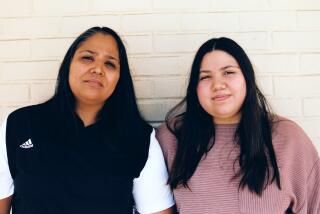Attention Isn’t Helping Elian Heal
- Share via
I know little about Elian Gonzalez except what I have read or seen on television. But I do know a lot about how young children deal with a parent’s death.
On Thanksgiving Day 1999, his mother tried to escape with 5-year-old Elian from Cuba to Florida in a small boat and, with most of the other passengers, drowned when the boat capsized. Miraculously, Elian survived, clinging to a tire for some time before he was found. He may have watched his mother drown. He has been living with relatives in Miami and has become the focus of a major international tug-of-war.
Apparently, Elian believes he will see his mother again, that she may be lost in Miami. There are several things we can be certain about: Elian does not understand or care about communism, democracy, Fidel Castro or Bill Clinton. He may care whether the little boys in his school will play with him or tease him because he does not have a mother. A knowledgeable, skilled teacher could protect him from some unfortunate experiences. Elian will be at least 9 or 10 before neighbors, school peers or teachers can be a source of support for him. At 6, his world consists of his immediate caretakers, and he will need these people desperately as he confronts the enormity of his mother’s death. If he did see his mother drown, he also will have to deal with this trauma. With all the excitement created by TV cameras and the distractions of daily showers of gifts, Elian probably has not yet confronted his profound loss.
In our study of children who lost a parent to cancer, it took weeks or months before children Elian’s age understood that the parent would never return. Once the young children understood that, they expressed their sadness and mourning through bed-wetting, irritability, stomachaches and wanting to sleep with the caretaker. With help, they began remembering the pleasant times, looking at pictures, reminiscing when encouraged by adults. As this happened, their irritability gradually subsided, their play became more normal and their development resumed. Still, there were moments of sad tears, memories tinged with loss and profound sadness.
Elian and his caretakers may have a different, far more difficult task. He may have to deal with the trauma before he can mourn his loss. Traumatic memories, rather than leading to the healing that mourning brings, can evoke horror about his mother drowning and his own vulnerability. He may have to face that hell before he can mourn. He may be plagued by intrusive memories of the experience, have nightmares and fears, and feel vulnerable and angry.
This trauma may be locked deep inside Elian now, but, like a festering sore, it will surface at some point, and he will have to face it and work it through. We can only hope this will occur sooner rather than later, because research suggests that the longer it is postponed, the harder it may be for Elian to assimilate the experience.
And what of the international storm? Its main effect may be indirect. Parenting any mourning child, not to mention a traumatized one, requires patience and undistracted, loving time. But being in the center of an international storm is distracting. One can only hope and pray that Elian will receive the loving parenting he needs, that his caretakers will receive the support and guidance they need, and that they will help him retain a memory of his mother as a loving parent.
The next storm Elian will need to survive is an extremely private one. A parent’s death affects a child for a lifetime. Although most children in our study, with support and help, did well in the near term, we know less about what will happen to them in the future.


